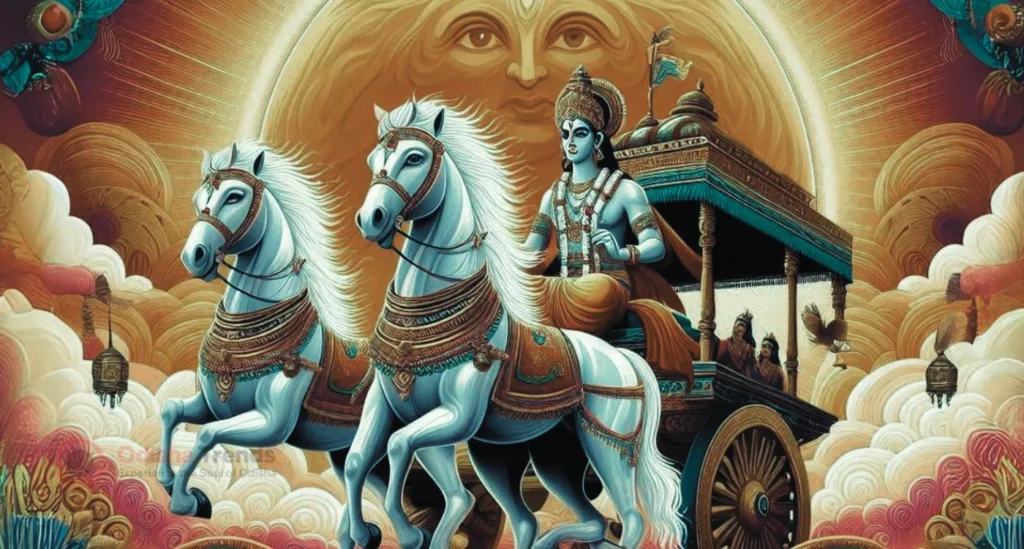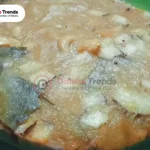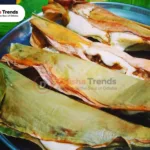Dhanu Muan: Odisha’s Traditional Winter Delicacy
Odisha is a land of rich culture, traditions, and mouthwatering cuisine. Among its many culinary treasures, Dhanu Muan holds a special place in the hearts of food lovers. This traditional winter delicacy, popular during the Dhanu Sankranti festival, is a perfect blend of simplicity and flavors that reflect the essence of Odia food.
What is Dhanu Muan?
Dhanu Muan is a sweet and crispy delicacy made primarily with puffed rice (Muan) and molten jaggery (Gur). The combination of puffed rice coated with caramelized jaggery creates a unique taste that is both crunchy and satisfying. It’s a healthy, traditional snack that is loved by people of all ages.
Cultural Significance of Dhanu Muan

Dhanu Muan is deeply tied to the Dhanu Sankranti festival, celebrated in Odisha during the winter season. It is often prepared as an offering to deities and shared among family and friends during festive gatherings. The dish represents prosperity, togetherness, and the rich culinary heritage of Odisha.
- Poda Pitha: A Traditional Odia DelicacyPoda Pitha is a beloved traditional sweet dish from Odisha, primarily prepared during the Raja Festival and other special occasions. This authentic Odia delicacy is a slow-cooked, caramelized rice cake infused with jaggery, coconut, and aromatic spices. Unlike regular… Read more: Poda Pitha: A Traditional Odia Delicacy
- Enduri Pitha Recipe | A Traditional Delicacy from OdishaEnduri Pitha is a traditional and authentic dish from Odisha, prepared especially during the festival of Prathamastami. This steamed delicacy is a part of Odisha’s rich culinary heritage and is enjoyed by Odia families with great enthusiasm. Made using… Read more: Enduri Pitha Recipe | A Traditional Delicacy from Odisha
Dhanu Muan, also known as Dhanu Sankranti or Dhanu Yatra, is one of the most vibrant and culturally significant festivals celebrated in Odisha, particularly in the Bargarh district. This unique festival, often referred to as the “world’s largest open-air theater,” holds immense cultural, religious, and historical importance. It is celebrated during the month of Pausha (December-January) and marks the beginning of the sun’s transition into the zodiac sign of Dhanu (Sagittarius). The festival reenacts the mythological episodes of Lord Krishna’s life, particularly his journey to Mathura to confront the tyrant king Kansa.
Historical and Mythological Roots
Dhanu Muan is deeply rooted in the Bhagavata Purana, a sacred Hindu text. The festival commemorates the divine play (Leela) of Lord Krishna and his triumph over evil, symbolized by the defeat of Kansa. The entire town of Bargarh transforms into Mathura, the river Jeera becomes the Yamuna, and the nearby village Amapali is depicted as Gokul. This grand reenactment brings to life the stories of Krishna’s childhood and his journey to Mathura, creating a captivating blend of devotion and drama.
Cultural Celebrations and Performances
The festival spans over 10-11 days and involves elaborate performances, processions, and rituals. Local artists and actors play the roles of Krishna, Balaram, Kansa, and other characters, while the entire community participates as spectators or performers. The streets of Bargarh come alive with colorful decorations, music, and dance, creating a festive atmosphere. The highlight of the festival is the dramatic enactment of Krishna’s arrival in Mathura and the eventual slaying of Kansa, symbolizing the victory of good over evil.

Social and Community Bonding
Dhanu Muan is not just a religious event but also a celebration of community spirit. It brings people together, transcending social and economic barriers. The festival fosters a sense of unity and collective participation, as everyone contributes to the preparations, performances, and celebrations. It also provides a platform for local artists to showcase their talent and preserve traditional art forms.
Tourism and Economic Impact
The festival has gained national and international recognition, attracting tourists and cultural enthusiasts from across the globe. It boosts local tourism and provides economic opportunities for artisans, performers, and small businesses. The government of Odisha has also promoted Dhanu Muan as a major cultural event, highlighting its significance in the state’s cultural calendar.
Why is Dhanu Muan Popular?
Authentic Taste: The sweet, earthy flavor of jaggery combined with the light texture of puffed rice makes it irresistible.
Healthy Snack: Dhanu Muan is a natural, guilt-free snack that is low in calories and rich in nutrients.
Festive Appeal: Associated with the Dhanu Sankranti festival, it’s a nostalgic treat that brings families together.
Easy Availability: Though traditionally homemade, Dhanu Muan is now widely available in markets across Odisha, especially during winter.
Dhanu Muan is more than just a snack; it’s a symbol of Odisha’s rich heritage and the joy of festive celebrations. Whether you’re a local or visiting Odisha, indulging in this sweet treat is an experience you shouldn’t miss.
- Poda Pitha: A Traditional Odia DelicacyPoda Pitha is a beloved traditional sweet dish from Odisha, primarily prepared during the Raja Festival and other special occasions. This authentic Odia delicacy is a slow-cooked, caramelized rice cake infused with jaggery, coconut, and aromatic spices. Unlike regular… Read more: Poda Pitha: A Traditional Odia Delicacy
- Enduri Pitha Recipe | A Traditional Delicacy from OdishaEnduri Pitha is a traditional and authentic dish from Odisha, prepared especially during the festival of Prathamastami. This steamed delicacy is a part of Odisha’s rich culinary heritage and is enjoyed by Odia families with great enthusiasm. Made using… Read more: Enduri Pitha Recipe | A Traditional Delicacy from Odisha
- Chitau Pitha Recipe – A Traditional of Odia FestivalsChitau Pitha (ଚିତଉ ପିଠା) is a classic Odia breakfast dish made from rice batter, coconut, and mild spices. Chitau Pitha Recipe – A Traditional of Odia Festivals during Manabasa Gurubar (Laxmi Puja). Known for its soft, fluffy texture and… Read more: Chitau Pitha Recipe – A Traditional of Odia Festivals
- Mahaprasad: Odisha’s Sacred Food TraditionIn the heart of Odisha’s spiritual and cultural heritage lies Mahaprasad, a sacred food tradition that transcends mere culinary delight. Mahaprasad, also known as Abhada, is the holy offering made to Lord Jagannath at the Jagannath Temple in Puri.… Read more: Mahaprasad: Odisha’s Sacred Food Tradition
- Chungdi Malai, Odisha’s Creamy Prawn DelightWhen it comes to Odia cuisine, Chungdi Malai stands out as a luxurious and flavorful dish that captures the essence of coastal Odisha. This creamy prawn curry, made with coconut milk, aromatic spices, and succulent prawns, is a culinary… Read more: Chungdi Malai, Odisha’s Creamy Prawn Delight








